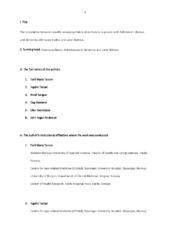| dc.contributor.author | Terum, Toril Marie | en_US |
| dc.contributor.author | Testad, Ingelin | en_US |
| dc.contributor.author | Rongve, Arvid | en_US |
| dc.contributor.author | Aarsland, Dag | en_US |
| dc.contributor.author | Svendsboe, Ellen J | en_US |
| dc.contributor.author | Andersen, John Roger | en_US |
| dc.date.accessioned | 2020-04-22T12:04:07Z | |
| dc.date.available | 2020-04-22T12:04:07Z | |
| dc.date.issued | 2019 | |
| dc.Published | Terum TM, Testad I, Rongve A, Aarsland D, Svendsboe EJS, Andersen JR. The association between specific neuropsychiatric disturbances in people with Alzheimer's disease and dementia with Lewy bodies and carer distress. International Journal of Geriatric Psychiatry. 2019;34(10):1421-1428 | eng |
| dc.identifier.issn | 1099-1166 | |
| dc.identifier.issn | 0885-6230 | |
| dc.identifier.uri | https://hdl.handle.net/1956/21974 | |
| dc.description.abstract | Objective: Neuropsychiatric symptoms (NPSs) are identified as important care‐recipient variables in terms of the impact on carer distress. The aim of this study was to determine whether specific neuropsychiatric disturbances in people with Alzheimer disease (AD) and dementia with Lewy bodies (DLB) differentially impact carer distress. Methods: This was a cross‐sectional study of people diagnosed with AD and DLB and their primary carers. The Relatives' Stress Scale (RSS) was used to assess the level of reported distress in carers, and the Neuropsychiatric Inventory (NPI) was used to assess NPSs. The effect of NPSs on carer distress was analyzed using correlation analysis and partial least squares regression. Results: This study included 159 participants diagnosed with AD (n = 97) and DLB (n = 62) and their primary carers (spouses and adult children). The majority of people diagnosed with dementia were women (64.2%), with a mean age of 75.9 years (SD, 7.4) and a mean Mini‐Mental State Examination (MMSE) score of 23.5 (SD, 2.9). The main analysis identified apathy as the most important NPS contributing to carer distress. Compared with AD, the explained variance in the DLB group was higher (r2 = 37.3 vs r2 = 53.7). In addition, more NPSs were considered clinically important in the DLB group. Conclusion: The findings of this study identify apathy as the most important NPS contributing to carer distress among carers of people with AD and DLB. These findings help us identify the support needs of families dealing with dementia. | en_US |
| dc.language.iso | eng | eng |
| dc.publisher | Wiley | eng |
| dc.title | The association between specific neuropsychiatric disturbances in people with Alzheimer's disease and dementia with Lewy bodies and carer distress | en_US |
| dc.type | Peer reviewed | |
| dc.type | Journal article | |
| dc.date.updated | 2020-01-29T12:51:46Z | |
| dc.description.version | acceptedVersion | en_US |
| dc.rights.holder | Copyright 2019 John Wiley & Sons, Ltd | |
| dc.identifier.doi | https://doi.org/10.1002/gps.5134 | |
| dc.identifier.cristin | 1709481 | |
| dc.source.journal | International Journal of Geriatric Psychiatry | |
| dc.source.pagenumber | 1421-1428 | |
| dc.identifier.citation | International Journal of Geriatric Psychiatry. 2019;34(10):1421-1428 | |
| dc.source.volume | 34 | |
| dc.source.issue | 10 | |
